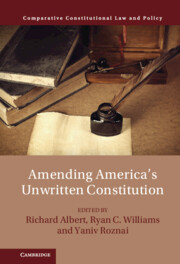Book contents
- Amending America’s Unwritten Constitution
- Comparative Constitutional Law and Policy
- Amending America’s Unwritten Constitution
- Copyright page
- Contents
- Contributors
- Acknowledgments
- Introduction A Return to Constitutional Basics: Amendment, Constitution, and Writtenness
- 1 The Unwritten Constitutions of the United States
- 2 Enumerating Amendments
- 3 Change Is the Only Constant: Unwritten Amendments and the Courts
- 4 The Role of the People in Unwritten Amendments
- 5 Unwritten State Constitutions? In Search of Constitutional Communities
- 6 State Constitutions and the Interaction between Formal Amendment and Unwritten Commitments
- 7 The Drive for a National Popular Vote for the Presidency: A Case Study in Amending the Unwritten Constitution
- 8 The Trump Presidency, the Racial Realignment, and the Future of Constitutional Norms
- 9 Amending an Unwritten Constitution: Comparative Perspectives
- 10 The Unwritten Foundations of (All) Written Constitutions
- Index
3 - Change Is the Only Constant: Unwritten Amendments and the Courts
Published online by Cambridge University Press: 13 October 2022
- Amending America’s Unwritten Constitution
- Comparative Constitutional Law and Policy
- Amending America’s Unwritten Constitution
- Copyright page
- Contents
- Contributors
- Acknowledgments
- Introduction A Return to Constitutional Basics: Amendment, Constitution, and Writtenness
- 1 The Unwritten Constitutions of the United States
- 2 Enumerating Amendments
- 3 Change Is the Only Constant: Unwritten Amendments and the Courts
- 4 The Role of the People in Unwritten Amendments
- 5 Unwritten State Constitutions? In Search of Constitutional Communities
- 6 State Constitutions and the Interaction between Formal Amendment and Unwritten Commitments
- 7 The Drive for a National Popular Vote for the Presidency: A Case Study in Amending the Unwritten Constitution
- 8 The Trump Presidency, the Racial Realignment, and the Future of Constitutional Norms
- 9 Amending an Unwritten Constitution: Comparative Perspectives
- 10 The Unwritten Foundations of (All) Written Constitutions
- Index
Summary
The first challenge in understanding the courts’ role in unwritten amendments is definitional. “Unwritten amendments” could be understood as overlapping with, but not identical to, amendments to an “unwritten constitution.” Or they could be amendments to the written constitution that leave no trace on the text of the written constitution. In this chapter, the author focuses on the latter in the hopes that it will illuminate the role of the courts. The undeniable reality is that at various times, the Constitution, or various provisions of the Constitution, has been understood in different ways. When those understandings might be considered “unwritten amendments,” however, is not immediately obvious. The author therefore begins by considering several possible definitions of that term she hopes will then help move us toward a more robust understanding of the role of the courts in interpreting, constructing, or participating in “amending” the Constitution.
Keywords
- Type
- Chapter
- Information
- Amending America's Unwritten Constitution , pp. 73 - 90Publisher: Cambridge University PressPrint publication year: 2022

